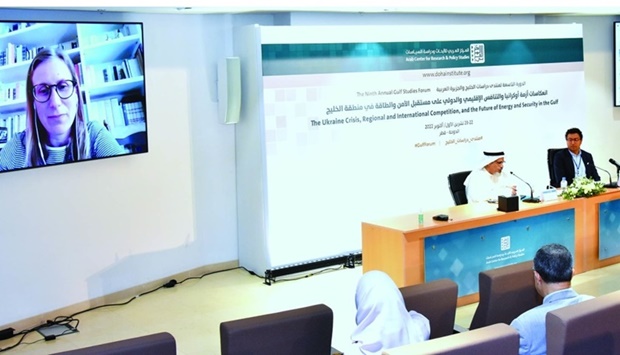"Since 2018, high local food production has put Qatar in a position to export some food products, such as dairy products," pointed out Dr Annamaria Mazzoni, a research associate at the Qatar Environment and Energy Research Institute (Qeeri). She was presenting a paper on 'Water, Food, and Energy Security in Crisis: Qatar Confronts the Ukrainian Crisis' at a session dedicated to the 'Impact of the Ukraine Crisis on Food Security in the Gulf' and chaired by Zafar al-Ajami.
An environmental economist, sustainability specialist, and policy analyst in the Environment and Sustainability Centre of Qeeri, Dr Mazzoni contended that the Ukraine crisis is likely to reshape alliances around the world, including within Arab Gulf states. The researcher explored how the Ukraine crisis may reshape intra-GCC ties and Gulf states relations with other Arab states, in looking at the issue through the lens of water, food, and energy.
“Qatar redefined countries from which it imported food and put a new food strategy 2020-2023. Nevertheless, challenges persist. Availability of water is still a major barrier, especially for food production, and the same is true of grain imports. Accordingly, exposure to climate change and water threats remain high,” Dr Mazzoni observed.
The researcher evaluated food diplomacy and multilateral trade management and co-operation between Qatar and other Arab states, with due regard for the requirements of continued sustainability. “These, along with the repercussions of the Ukraine crisis, remain pressing issues,” she concluded.
An environmental economist, sustainability specialist, and policy analyst in the Environment and Sustainability Centre of Qeeri, Dr Mazzoni contended that the Ukraine crisis is likely to reshape alliances around the world, including within Arab Gulf states. The researcher explored how the Ukraine crisis may reshape intra-GCC ties and Gulf states relations with other Arab states, in looking at the issue through the lens of water, food, and energy.
“Qatar redefined countries from which it imported food and put a new food strategy 2020-2023. Nevertheless, challenges persist. Availability of water is still a major barrier, especially for food production, and the same is true of grain imports. Accordingly, exposure to climate change and water threats remain high,” Dr Mazzoni observed.
The researcher evaluated food diplomacy and multilateral trade management and co-operation between Qatar and other Arab states, with due regard for the requirements of continued sustainability. “These, along with the repercussions of the Ukraine crisis, remain pressing issues,” she concluded.

